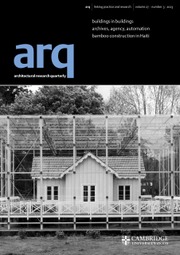No CrossRef data available.
Article contents
Utzon
Published online by Cambridge University Press: 11 February 2004
Extract
It has taken a long time to be able to assess Jørn Utzon's importance. Until the end of the twentieth century, the architect described by Sigfried Giedion as the most important of the ‘third generation’ hardly appeared in its literature. By contrast we had no such problem with Le Corbusier: there were the Oeuvres Complètes. It was easy to consult any building, indeed sketch, and along the way to be thoroughly coerced into his theoretical position. His massive and megalomaniac contribution to the last century could be studied first through L'Esprit Nouveau, the avant-garde magazine which promulgated him – ‘17.23, 2me février, 1926, Grande Pensée de L-C …’ and so forth – and later through the archives and sketchbooks. Wright suffered from too many publications. After the Wasmuth Portfolio of 1910 there was no single, accessible reference to his huge output: his theory tended to the verbose, and he was devious in concealing his own sources, most especially his debt to Japan. Mies van der Rohe wrote little and was famously gnomic; his buildings supplied his ‘text’. The so-called second generation, Aalto and Kahn, were well served in terms of publication of their work. The former's theoretical position took much posthumous teasing-out by critics to become widely understood. He could overcome people's ignorance of Finnish – for example, by his 1961 definition ‘acoustic separation is kilograms’ and by his stupefied reaction to the question of what module he used: ‘a millimetre, more or less!’ – but he wrote little.
- Type
- Arq reviews
- Information
- Copyright
- © 2003 Cambridge University Press




